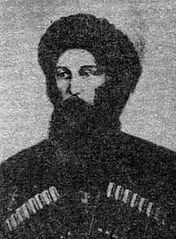- Sheikh Mansur
-
- Not to be confused with Sheikh Mansour
Sheikh Mansur Usharma 
Born 1732
Aldi, ChechnyaDied April, 1794 (aged 61)
Shlisselburg, Russian EmpireSheikh al-Mansur ("The-Sustained") (1732–1794) was a Chechen leader who led the resistance against Catherine the Great's imperialist expansion into the Caucasus during the late 18th century. He remains a legendary national hero of the Chechen people.
Early life
He was born in the aul of Aldy, near the Sunja River under the Elstanzhkoj teyp and given the name Ushurma. He became known as Sheikh Mansur.
Another, more controversial version of Mansur's origins revolves around the 1876 discovery by a professor in Turin, Italy, of a collection of letters allegedly written by Mansur to the professor's father.[1] In them, Sheikh Mansur revealed that he was in reality an Italian called Giovanni Battista Boetti, born in Camino (Monferrato, Piedmont) on June 2, 1743.[2] In the early 1770s, Boetti entered the Dominican Order[3] and was sent as a missionary to Mosul, where his love affair with a daughter of the local pasha caused a scandal. The last traces of Boetti date to 1780, after which year he vanishes. The letters allege Boetti subsequently converted to Islam, traveled to the Caucasus, and (under the name of Mansur) became a leader of that region's fight for independence against Russia.[4] Controversy has surrounded the "Boetti Letters" since their discovery, with some scholars holding them to be either an 18th century prank or 19th century forgeries.[5]
Chechen leader
In 1784 Sheikh Mansur, now an Imam, became upset with the Russian encroachment in the North Caucasus. He proclaimed a holy war, called Ghazawat (Jihad), against the Russians to the north. Having been trained in Daghestan under the Naqshabandi school of Sufism, he returned to Chechnya. He ordered Chechen people to stop practicing many of their old pagan traditions with the cult of the dead, to stop smoking tobacco, to replace the customary laws (adats) with Islamic law (shari'ah) and to attempt Islamic unity. This was not easy in a land where people had lived under ancient traditions, customs and religions. Islamic tradition in Chechnya, especially in the mountains, was not as strong as it was in Daghestan. But the holy war that he declared was an attempt at unity.
In 1785 Sheikh Mansur and his fighters destroyed Russian forces in the Battle of the Sunja River. Historical documents show that Russian Colonel Pieri and more than 600 Russian soldiers were killed in this battle.[6] Sheikh Mansur rallied resistance fighters from Daghestan through Kabarda. Most of the forces were Daghestani and Chechen, numbering more than 12,000 by December 1785. However, Mansur suffered a defeat when he tried to enter Russian territory and failed to take over the fort of Kizlyar. He subsequently failed to take Tatarup in Kabarda. After this, the Russians refortified their settlements, but Catherine the Great withdrew her forces from Georgia to the Terek River line.
In 1786 Catherine the Great abandoned the new fort of Vladikavkaz, and would not occupy it again until 1803. From 1787-1791, during the Russian-Turkish War, Sheikh Mansur moved to the northwestern Caucasus region of Adygei, strengthening the Islamic traditions there. He led the Adygei and Nogai peoples in assaults against the Russians, but they were defeated many times. In June 1791, Sheikh Mansur was captured at the Turkish fortress of Anapa on the Black Sea. He was brought to St. Petersburg and imprisoned for life. In April, 1794 Sheikh Mansur died in Shlisselburg.
References
- ^ http://www.bbc.co.uk/blogs/adamcurtis/2009/09/kabul_city_number_one_1.html
- ^ Robert C. Melzi, ⇒The Conquering Monk, Giovanni Battista Boetti
- ^ http://www.bbc.co.uk/blogs/adamcurtis/2009/09/kabul_city_number_one_1.html
- ^ Serena Vitale, ⇒L'imbroglio del turbante
- ^ "The Legend of Boetti Sheikh Mansur" by Franco Venturi, Central Asian Survey, Vol. 10. No. 1-2 (1991)
- ^ John Frederick Baddeley, The Russian Conquest of the Caucasus, London, Curzon Press, 1999, p. 49.
Categories:- 1743 births
- 1794 deaths
- Caucasus
- Chechen people
- Chechen politicians
- People of the Chechen wars
- Converts to Islam
- Sunni imams
- Muslim generals
- Italian Christian monks
Wikimedia Foundation. 2010.
